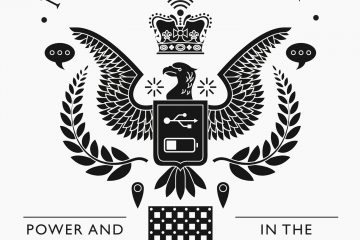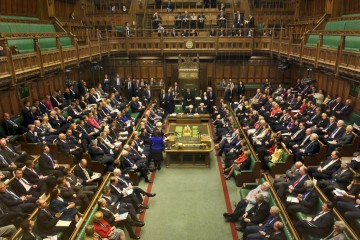
On Writing: A conversation with Tom Fletcher, author of Naked Diplomacy [Part III]
Dr Tristen Naylor, Oxford’s Lecturer in Diplomatic Studies, chatted with Tom Fletcher, the former British Ambassador and Downing Street foreign policy advisor, about his new book, Naked Diplomacy. In this three-part series their discussion explores everything from diplomacy in the digital era to the divide between academics and policy makers — with a nod to the intertextuality of W.H. Auden and Black Sabbath along the way. For Part I, see here, and Part II, see here. TN: I want to talk about your style of writing and your approach to it. I spend most of my waking hours reading works on diplomacy and I spend much of that time asking myself why I self-inflict such torture because so much of it – too much …

Communication in the 21st Century: A conversation with Tom Fletcher, author of Naked Diplomacy [Part II]
Dr Tristen Naylor, Oxford’s Lecturer in Diplomatic Studies, chatted with Tom Fletcher, the former British Ambassador and Downing Street foreign policy advisor, about his new book, Naked Diplomacy. In this three-part series their discussion explores everything from diplomacy in the digital era to the divide between academics and policy makers — with a nod to the intertextuality of W.H. Auden and Black Sabbath along the way. For Part I, see here. TF: In diplomacy, like any other trade, there are people who simplify and people who complicate. I tend to side with the simplifiers. TN: I can easily see that. Just taking the very start of your book as an example, you begin with W.H. Auden’s ‘The Embassy’, which so elegantly and simply …

Diplomacy, Academia, and The Threat of Irrelevance: A conversation with Tom Fletcher, author of Naked Diplomacy
Dr Tristen Naylor, Oxford’s Lecturer in Diplomatic Studies, chatted with Tom Fletcher, the former British Ambassador and Downing Street foreign policy advisor, about his new book, Naked Diplomacy. In this three-part series their discussion explores everything from diplomacy in the digital era to the divide between academics and policy makers — with a nod to the intertextuality of W.H. Auden and Black Sabbath along the way. See Part II here. TN: Tom, your new book is Naked Diplomacy and your blog is The Naked Diplomat. Borrowing from Jamie Oliver as the ‘Naked Chef’, who sought to strip cooking back to its bare essentials, you’re seeking to do the same with diplomacy. Why do you think that doing so is necessary now? TF: …

The Labour Case for Vote Leave
‘I will be voting to leave the European Union’. It is a sentence which almost always attracts gasps of horror from my fellow students and dons in Oxford, one of the most pro-EU cities in Britain. But, polls show that at least 40% of the British public, many of whom voted Labour in the last general election, agree with me. My decision to vote ‘Leave’ is based on my belief in democracy, socialism, and a political economy which protects the living standards of the British working class. As a Labour member since I was eighteen, I will be voting to leave the EU not in spite of the principles which led me to the Labour Party but because of them. …

MP expenses and their assessment in the media: Towards a more informed analysis
MPs’ expenses continue to fascinate the British media and public alike. Every autumn, the Independent Parliamentary Standards Authority[1] (IPSA) publishes a detailed breakdown of the House of Commons MPs’ expenses for the year, and news outlets rush to publish their analyses of this data. Tabloids (e.g. Daily Record) as well as broadsheets and magazines (The Guardian, The Economist) create rankings or tools that allow users to compare MPs’ expenses and single out big spenders. Such efforts are contextualised by the inveterate public ire over perceived excesses, exacerbated by the on-going austerity measures and a culture of ‘naming and shaming’. But most of these comparisons are highly problematic because they fail to provide important contextual information, simply comparing MPs’ total expenses (overall …

The Brexit Campaigns: In Out, In Out, Shake It All About
The rival camps are taking shape. Organisations have been launched, slogans road tested and logos commissioned. While no one knows when the EU referendum will take place, everyone has decided it’s time to make their case. A couple of weeks in, and the similarities between the Leave and Remain camps are as as striking as the differences. Both are quick to underline their patriotism; both go out of their way to emphasise British strength. No one, not even in the ‘remain’ camp, seems particularly fond of the European Union. And – perhaps most importantly – both campaigns are profoundly divided. On the ‘leave’ side, we have Leave.EU and Vote Leave, run by Matthew Elliott of Taxpayers Alliance fame. While the …

Experimenting with citizens’ assemblies in the UK
In October and November, two citizens’ assemblies will be taking place in Sheffield and Southampton. Organised by a coalition of academics and civil society organisations under the banner Democracy Matters, Assembly North and Assembly South represent significant interventions in contemporary British politics. First, the assemblies will be dealing with a fundamental constitutional question: how should we be governed? The main focus of the assemblies will be devolution and decentralisation of power to English regions. The Devolution Deals that are current government policy are piecemeal reforms. And as the term ‘Deal’ suggests, they are stitched together by local and national elites: citizens have had no say in how they should be governed. Following the much publicised Devolution Deal for Greater Manchester, …

So, what was Magna Carta?
This year, we celebrate the eight-hundredth anniversary of one of the most revered documents in English history. On 15 June 1215 at Runnymede (a small meadow outside of London, marking the midpoint between two armies locked in civil war) King John set his seal on Magna Carta – the ‘great charter’ that has become synonymous throughout the world with opposition to arbitrary rule, and with the protection of individual rights and liberties. But what, exactly, was Magna Carta? Few of John’s contemporaries could have guessed at its enduring and universal significance. Magna Carta was the product of a specific breakdown in feudal authority. It was a peace treaty and a political settlement, aimed at bringing to an end months of …









